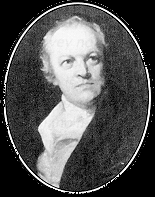 The
poetry expressed his belief in the poet as a prophet and his sympathy for
revolutionare movements.
The
poetry expressed his belief in the poet as a prophet and his sympathy for
revolutionare movements. In the english literature Blake and Dickens speak of the theme of illusion.
LIFE
William Blake was born in London in 1757 into a lowerclass family. He took to writing poetry and published Songs of Innocence and Songs of Innocence and of Experience. The sale of this and other books was not a success.
 The
poetry expressed his belief in the poet as a prophet and his sympathy for
revolutionare movements.
The
poetry expressed his belief in the poet as a prophet and his sympathy for
revolutionare movements.
For him imagination is the ability to see more deeply into the life of things, a power which he saw as peculiar to the poet, to the child and to the man in a state of innocence.
He described "innocence" and "experience" as the two contrary states of the human soul.
Innocence: refers to the condition of child who has not yet exprerienced the evils. This is a bright world of happiness and freedom. This inner state of innocence is externalized in a world of images such as the lamb and the child and is based on feelings of love and generosity. Innocence is an ideal to be struggled for in a corrupt and wicked world.
Experience: is the world of normal adult life and it is represented with chimney sweep, the hapless soldier and the young prostitute of the poem; this is a world oppresses.
THE LAMB = lamb is the symbol of God's innocence and a demonstration of his love for his creatures.
THE CHIMNEY SWEEPER = a child can have visions and dreams.
Blake's view of the poet is that of a visionare man.
STYLE: Blake uses simple lexis and syntax; his poems are rich in images.
|
THE LAMB
Little
Lamb, who made thee?
Dost
thou know who made thee? Gave thee life, and bid thee feed By the streams and over the mead; Gave thee clothing of delight, Softest clothing, woolly, bright; Gave thee such a tender voice, Making all the vales rejoice? Little Lamb, who made thee? Dost thou know who made thee?
Little Lamb, I'll tell thee,
Little Lamb, I'll tell thee: He is called by thy
name, For he calls Himself a Lamb, He is meek, and He is mild; He became a little child. I, a child, and thou a lamb. We are called by his name. Little Lamb, God bless thee! Little Lamb, God bless thee!
|
|
THE CHIMNEY SWEEPER
When my mother died I was very young, And my father sold me while yet my tongue So your chimneys I sweep, and in soot I sleep. There's little Tom Dacre, who cried when his head, And by came an Angel who had a bright key,
|